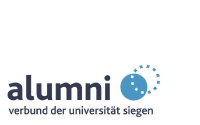Kenya: Dr. Nadir Hashim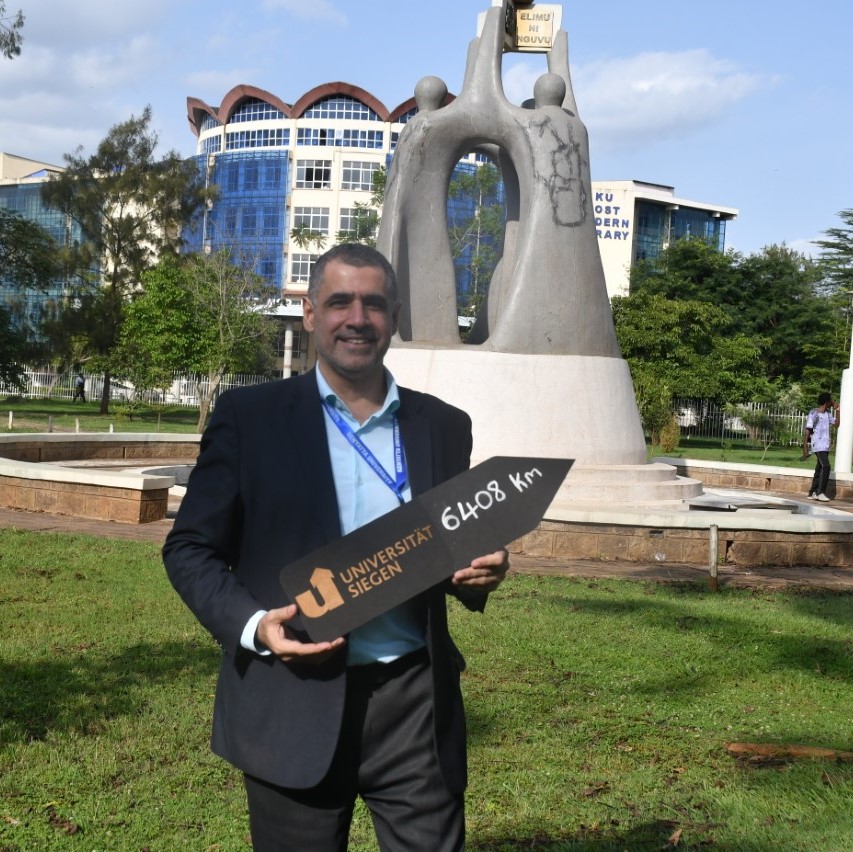
Kenyatta University, Nairobi, Kenya
Nairobi ⇔ Siegen
[read more]
Dr. Nadir Hashim completed
his doctoral studies in July 2007 in the
Department of Physics, Emmy Noether Campus.
The studies were supported by the German
Academic Exchange Service (DAAD). The
doctoral thesis by Nadir Hashim was on the
measurement of the momentum spectrum of
cosmic ray muons under the supervision of
Prof. Dr. Claus Grupen. The measurements
were taken at the European Organization for
Nuclear Research (CERN). This is the
world's largest facility for research in
particle physics.
During his studies at Siegen University,
Nadir Hashim had the opportunity to
regularly attend and share his research
findings during the Annual Spring meetings
of the German Physical Society (DPG) and
also at international conferences. He also
served as a guest scientist at the Max
Planck Institute for Nuclear Physics in
Heidelbert under the supervision of Prof.
Dr. Michael Schmelling. Nadir Hashim had
the opportunity to meet and interact with
Physics Nobel Laureates during a meeting in
Lindau, Germany.
Throughout his stay in Siegen, Dr. Nadir
Hashim integrated very well with the local
community. He actively engaged in sporting
activities. He was an active member of the
Dive Club Octopus in Siegen. He
successfully completed the half marathon in
Hannover and full marathon in Berlin.
Dr. Nadir Hashim currently works in the
Department of Physics at Kenyatta
University. He has served as the head of
the department and has supervised over 30
postgraduate students in physics. He
coordinates the African Network for
Education in Nuclear Science and Technology
(AFRA-NEST). Additionally, he was the
chairman of the national technical
committee of the Square Kilometre Array
(SKA) project in Kenya. The SKA is the
world's largest array of radio telescopes,
set to operate in Africa and Australia. Dr.
Nadir Hashim has played a crucial role in
the development of astronomy and
astrophysics in Kenya.
Dr. Nadir Hashim: "Here
you can see me in front of a university
monument with the following saying in
Kiswahili: 'Elimu ni Nguvu,' which means
'Education is power.' Kenyatta University
is a state/public university that enjoys a
good reputation in the education sector."
|
Thailand: Prof. Dr. Korakoch
Attaviriyanupap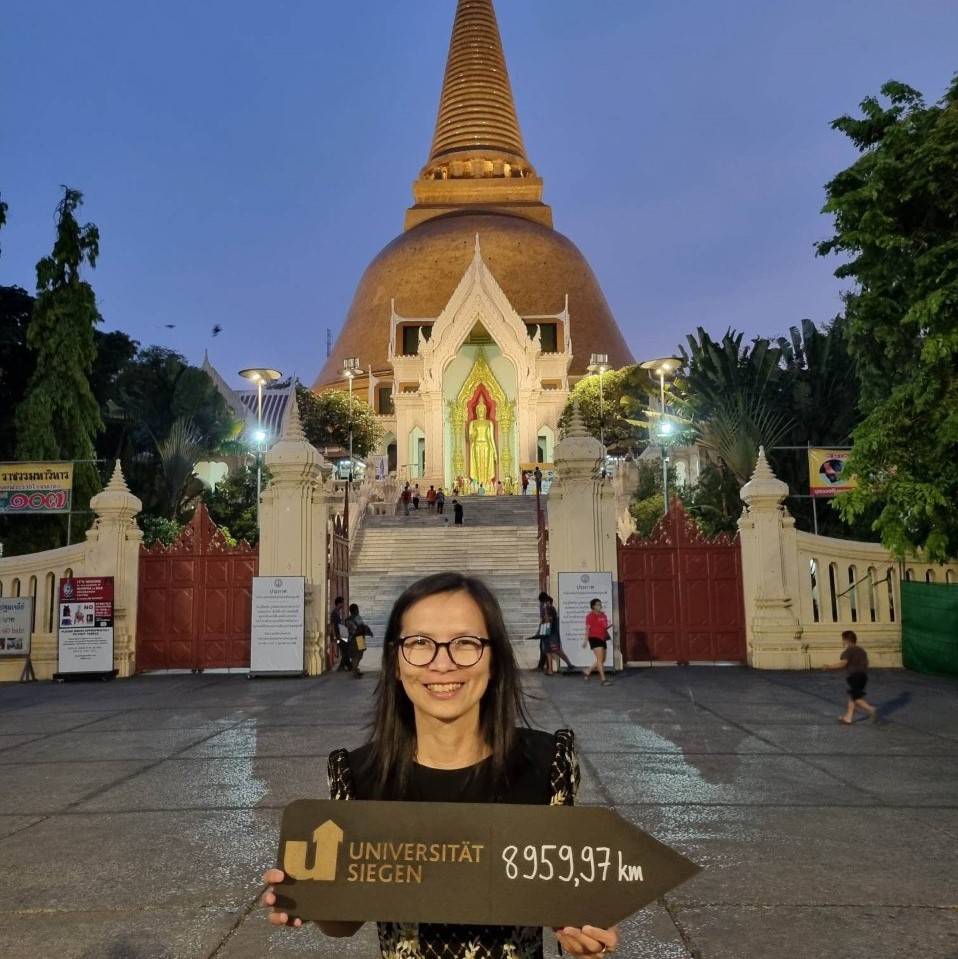
Phra Pathom Chedi, Nakhon Pathom, Thailand
Nakhon Pathom ⇔ Siegen
[read more...]
Dr. Korakoch
Attaviriyanupap visited Siegen
University for the first time in 2009 as
part of a research cooperation. Since then,
together with her cooperation partner Prof.
Dr. Petra Vogel and other colleagues, she
has repeatedly conducted research on
questions of contrastive linguistics of the
German and Thai languages during various
research stays in Siegen. Her findings are
of particular interest to the department of
German as a Foreign Language at her
university in Bangkok. This field of
research, which Dr Attaviriyanupap is
working on, is widespread in Thailand.
In addition to her commitment to research,
Dr Attaviriyanupap is also involved in the
international exchange between alumni of
the University of Siegen and the research
projects that develop from this within the
framework of the Alumni Academy.
Dr. Korakoch
Attaviriyanupap: „The Phra Pathom
Chedi, the tallest Buddhist Chedi the
world, is considered the landmark of the
city of Nakhon Pathom in Thailand, about 60
kilometres southwest of Bangkok.
My university, Silpakorn University, has a
campus in this city where our German
department is located. When you go south by
train in Thailand, you pass this city and
from the train you see this big Chedi I
therefore find a connection here with the
"Krönchen" in Siegen, which I can see on
the train to Siegen.“
|
Korea: Prof. Dr. Kee Hwan Kim
Semyung University, Jecheon Chungbuk, Korea
Jecheon ⇔ Siegen
[more...]
Dr. Kee Hwan Kim received
his Ph.D. in Electrical Engineering in 1995
from the University of Siegen under Prof.
Kunz, Chair of Power Electronics and
Electrical Drives. Today, he is a professor
in the Department of Electrical Engineering
at Semyung University in Korea. His
research interests include automation
technology in the field of IoT.
Dr. Kee Hwan Kim: "The
photo shows the Greyhound Garden in front
of the Academic Building at Semyung
University. The greyhound symbol signifies
the idea that continuous scientific pursuit
can illuminate the world." The Semyung
University, SMU, is located in the city of
Jecheon in the north of the South Korean
province of Chungcheongbuk-do.
|
Sri Lanka: Prof. Dr. Neelakshi C.
Premawardhena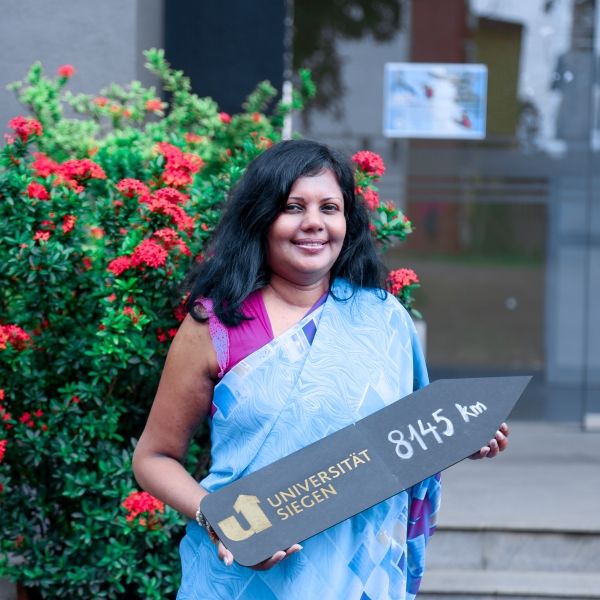
University of Kelaniya, Faculty of
Humanities, Sri Lanka
Kelaniya ⇔ Siegen
[more...]
On 22.03.2025 we received the sad news that
Prof. Dr. Neelakshi C. Premawardhena passed
away suddenly. Her death has hit us all
hard and leaves a huge gap.
Dr. Neelakshi Chandrasena
Premawardhena is a Professor in
the Department of Modern Languages and the
Director of the Centre for International
Affairs at the University of Kelaniya in
Sri Lanka. She received her B.A. (Honours)
Degree and M.Phil from the University of
Kelaniya and her Ph.D. from the University
of Siegen, Germany. She has been associated
with the University of Kelaniya since 1994,
teaching German and Linguistics to
undergraduates and postgraduates.
As a recipient of several international and
national awards and as a visiting scholar
at international universities and events,
Prof. Premawardhena has published numerous
research papers in her favor. Her research
interests include intercultural
communication, intercultural pragmatics,
sustainable development, social and
cultural sustainability, learning
traditions, discourse analysis, politeness
forms, reference indices, second and
foreign language acquisition, culture in
foreign language teaching, use of media in
language teaching, and language change. One
of the highlights of her current projects
on sustainability and poverty alleviation
is the project with disadvantaged women in
Sri Lanka" involving students and artisans
in the Craft Village, Battaramulla, Sri
Lanka.
Dr. Neelakshi Chandrasena
Premawardhena: "The Faculty of
Humanities is the oldest faculty of the
University of Kelaniya. The academic
tradition and history of the Faculty of
Humanities trace back to the founding of
the Vidyalankara Pirivena (Monastic College
for Buddhist Monks). The Vidyalankara
Higher Educational Center was established
in 1875 on the initiative of the Venerable
Sri Dharmaloka Thero and upgraded to the
Vidyalankara University in 1959. Today, the
former faculties of the Vidyalankara
Pirivena, the Faculty of Languages, the
Faculty of Buddhism, and the Faculty of
Philosophy, are under the Faculty of
Humanities. Degree programs in foreign
languages such as German and French began
in the academic year 1963/64 to bring the
faculty to an international level."
|
Dr. Nahid Akhtar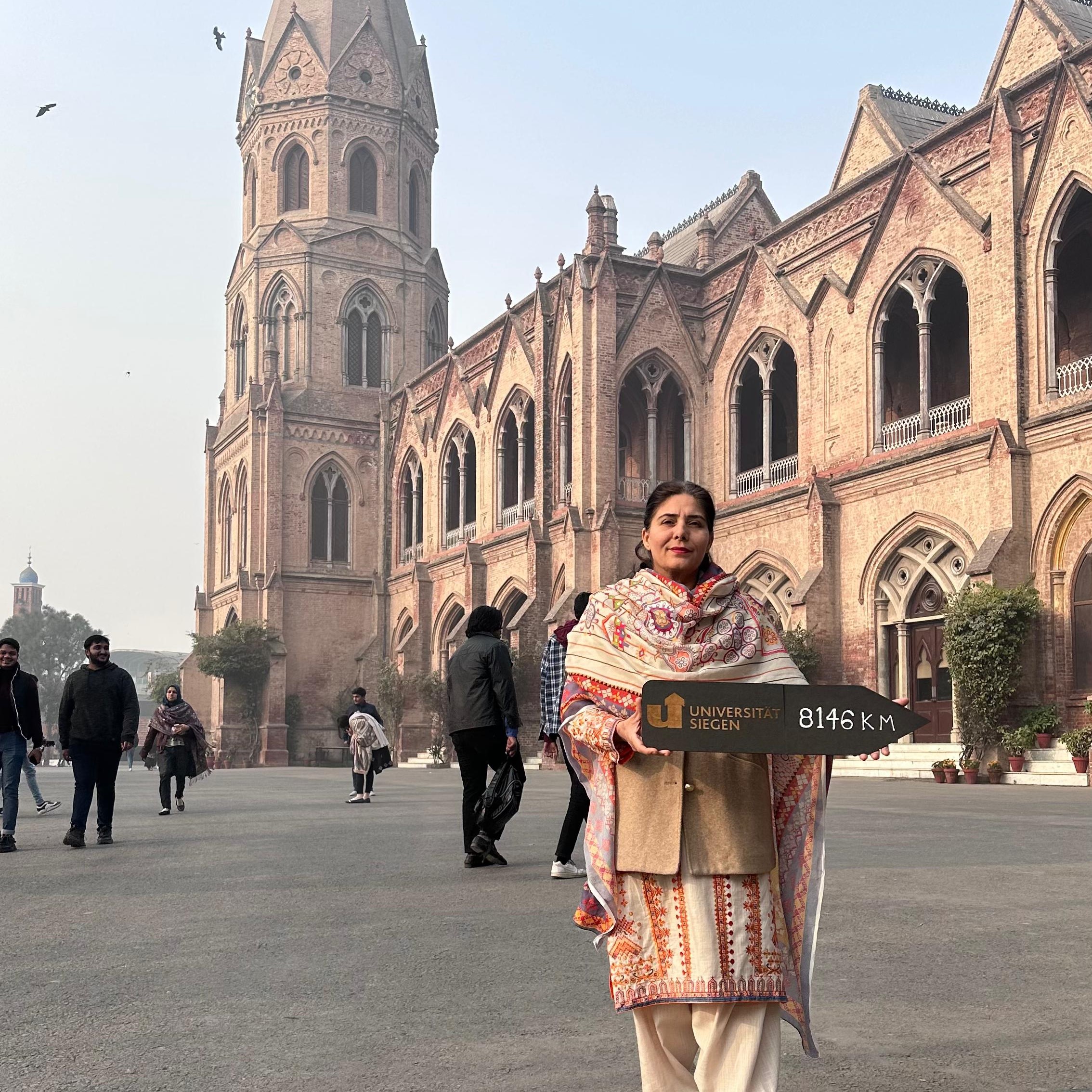
Government College University, Lahore,
Pakistan
Lahore ⇔ Siegen
[read more]
Pakistan: Dr. Nahid Akhtar
is a lecturer for Mathematics at the
Government College University, Lahore. She
got admission in PhD studies at University
of Kaiserslautern in 2005. Here she did her
language course, PhD admission thesis and
started her PhD. After almost three years,
her supervisor Prof. Dr. Volker Michel
moved to the University of Siegen and
established Geomathematics group here. She
also changed her university and became a
PhD student at the University of Siegen.
“It was only one year at the University of
Siegen and definitely was very busy year. I
was finalizing my thesis and spending most
of the time at the Emmy-Noether-Campus of
the University of Siegen. I could not visit
whole university during that time. I was
also familiar to some main parts of the
city only. But with the activities of
Alumni Academy , I am again connected to
University of Siegen, meeting to faculties,
have chance to learn more about university
in all possible aspects. I just find it my
second home in this world. I feel like home
when I reach here or I am away. There is
strong emotional binding now. And I give
this credit to Dr. Susanne Padberg and her
team, who don’t leave us alone and keep
helping us, engaging us and motivating us.
I have great love and respect for my
university.”
Dr. Nahid Akhtar: "This is
Government College University, Lahore -
also known as GCU, Lahore, where I am
standing in front of the main building.
It's architecture looks like church and was
was built in 1856. It's tower is called
Gothic lady. I am working here since 2002
as permanent faculty at department of
Mathematics. I am also teaching and
promoting German language as Foreign
language from couple of years.
In 1864, the GCU was established by the
British government in India. It is among
the ten largest educational institutions in
Pakistan with a student body of over
12,000. It has 32 academic departments,
segregated into five faculties. There are
five research centers, focused on academic
and industrial research and development
projects. It has the highest graduation
rate in the country, with an average of
94.6% annually.
Government College University is noted for
its historical roots and produced notable
scholars such as poet-philosopher Allama
Muhammad Iqbal, Nobel laureates Har Gobind
Khorana and Abdus Salam, former president
of both the United Nations General Assembly
and the International Court of Justice
Muhammad Zafarullah Khan. It has produced a
large number of international players,
politicians, novelists, poets, thinkers
etc. The university's emblem, a torch,
symbolises the light of knowledge. The
motto of the GCU "Courage to know"
represents the guiding principle of the
student community."
|
South Africa: Prof. Dr. Pamela
Dube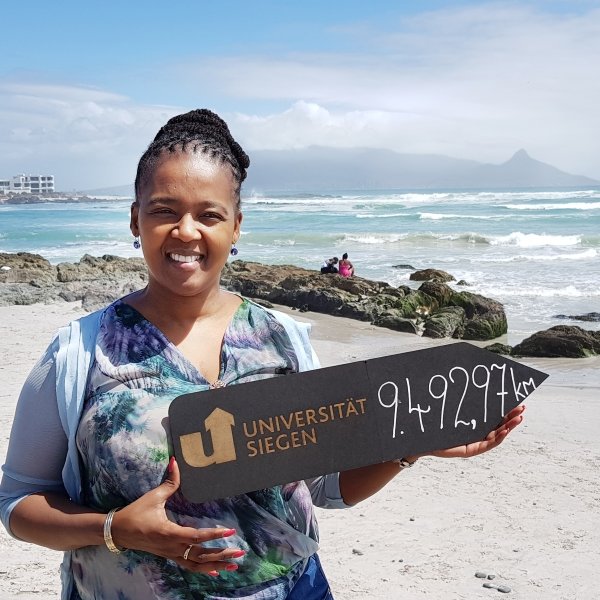
West Coast of Cape Town, view of Table
Mountain and Robben Island, South Africa
Kapstadt ⇔ Siegen
[read more]
Dr. Pamela Dube is
Principal and Vice-Chancellor of the CUT -
Central University of Technology, Free
State, Blomfontein in South Africa. She
obtained her MA and Doctoral degrees in
English Literature studies at the
University of Siegen.
In her home country, South Africa, among
other roles that include national
government positions in the Department of
Education, she established an International
Office focused on strategic partnerships as
Senior Manager in the Office of the CEO at
the Nuclear Energy Commission of South
Africa (NECSA). To date she has worked at
various universities as the Vice
Chancellor's Special Advisor in the area of
Internationalisation and Student Affairs at
the University of Johannesburg followed as
Executive Director for Human Resources and
finally herself in the position as Deputy
Vice-Chancellor designate for
Internationalisation, Advancement and
Student Affairs. She also spent brief time
as consultant to the Vice-Chancellor and
Principal at the Kathmandu University in
Nepal and lecturer for Media Studies and
returned to South Africa to serve as Dean
of Students at the University of the
Witwatersrand in Johannesburg, followed by
the position of Deputy Vice-Chancellor for
Student Development and Support at the
University of the Western Cape in Cape
Town, before taking her current position as
Principal and Vice-Chancelor at the CUT -
Central University of Technology, Free
State, Blomfontein.
Dr. Pamela Dube: "This is
Blouberg, on the West Coast of Cape Town,
in South Africa. I live there and this is
my special place where I often take a walk
along the sea, with both the view of Table
Mountain ahead of me and on my left that of
Robben Island. Our national icon, uTata
uMadiba, Nelson Mandela as he is widely
known, was imprisoned for 27 years at
Robben Island.
I draw great inspiration from this place
and the exemplary leadership that Mandela
embodied and I am always reminded of this
wonderful quote from him ‘What counts in
life is not the mere fact that we have
lived. It is what difference we have made
to the lives of others that will determine
the significance of the life we lead’. This
is the special message I would like to
share as part of expressing my everlasting
gratitude for the opportunity to be linked
with the University of Siegen as my Alma
Mater. My student experience and support at
the University of Siegen has enrinched my
appreciation of my own country and
amplified my role in it. It continues to
impact on my professional growth and
validation of my personal worth as a human
being and as a global citizen, - that I am
‘good enough’, regardless of my background,
race or gender."
|
Thailand: Prof. Dr. Wilita
Sriuranponga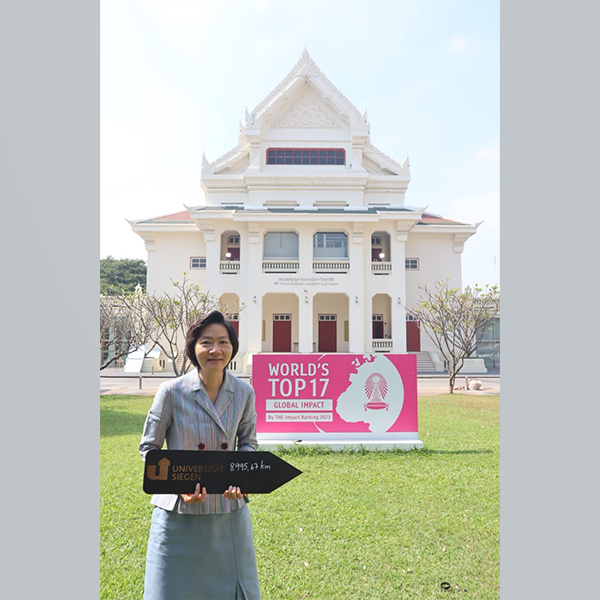
Auditorium of Chulalongkorn University in
Bangkok, Thailand
Bangkok ⇔ Siegen
[read more]
Dr. Wilita Sriuranpong is
a professor in research and teaching in the
Department of Western Languages, German
Section, at Chulalongkorn University in
Bangkok. She has actively managed the
Department and the German Section in
various leadership positions. Chulalongkorn
University is the only university in
Southeast Asia that offers a doctoral
programme in German Studies. Dr Wilita
Sriuranpong completed her doctoral studies
at the University of Siegen under the
supervision of Burkhard Schaeder, Professor
of German Studies. During various research
stays at the University of Siegen, she also
conducted research in the field of
linguistics.
Dr. Wilita Sriuranpong:
The photo shows me in front of the
auditorium of Chulalongkorn University, the
oldest university in Thailand. This is the
university where I studied and work. The
auditorium was built in 1939 and is one of
the well-known symbols associated with the
university. It is a venue for important
ceremonial events, including degree
conferral ceremonies. In this context, this
place, or Chulalongkorn University as a
whole, has a similar significance for me as
the University of Siegen, in that both have
broadened my academic thinking and
significantly shaped my academic
competences.
|
Albania: Prof. Dr. Kledi
Xhaxhiu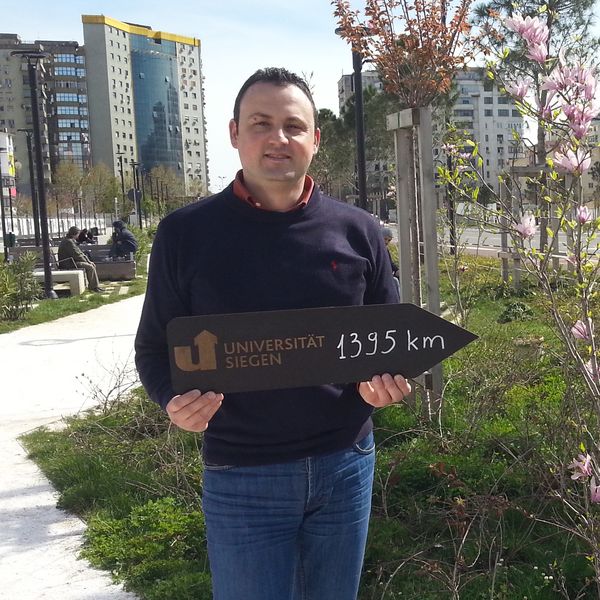
New alley in Tirana, Albania
Tirana ⇔ Siegen
[read more]
Dr. Kledi Xhaxhiu received
his degree in food chemistry from the
University of Tirana after finishing his
thesis at the University of Siegen, he then
stayed at the University of Siegen to
complete his PhD. He is now engaged in
research and teaching at the Faculty of
Natural Sciences at the University of
Tirana, he also works for the government of
Albania as the Deputy Minister of the
Environment.
Dr. Kledi Xhaxhiu: "This
photo was taken at the new avenue of
Tirana, in proximity to the Faculty of
Natural Sciences of the University of
Tirana. A new avenue always signifies new
perspectives in the background."
|
Mexico: Dr. Saúl
Tovar-Arriaga
"El Jugador de Pelota" (The Ball Player),
in front of the rectory esplanade of the
Autonomous University of Queretaro, Mexico
Santiago de Querétaro ⇔ Siegen
[read more]
Dr. Saul Tovar-Arriaga
received his Master of Science in
Mechatronics from the University of Siegen.
He then obtained his PhD in Biomedical
Sciences from the University of
Erlangen-Nuernberg. Currently, he is a
full-time professor at the Faculty of
Engineering of the Autonomous University of
Queretaro and is the coordinator of the
Master of Science in Artificial
Intelligence. His research interests
include automatic medical diagnosis and
artificial intelligence.
Dr. Saul Tovar-Arriaga:
"The photo shows a sculpture called "El
Jugador de Pelota" (The Ball Player) made
by sculptor David Manzanares de la Fuente,
which is located in front of the rectory
esplanade of the Autonomous University of
Queretaro. The sculpture is inspired by one
element that makes up the University's coat
of arms. This symbol comes from a Mayan
disk with the image of the player hitting
the ball in the center, alluding to the
origin of the game.
The Mesoamerican ball game (in Nahuatl:
tlachtli or ollamalistli, in Classic Maya:
pitz) was a sport with ritual and warlike
connotations, played since 1400 B.C. by the
pre-Columbian peoples of Mesoamerica; it
was practiced both in daily life and in
religious celebrations. It apparently
served to resolve conflicts of various
kinds: land disputes, tribute, trade
controls, and others."
|
Ghana: Dr. Efua Esaaba
Agyire-Tettey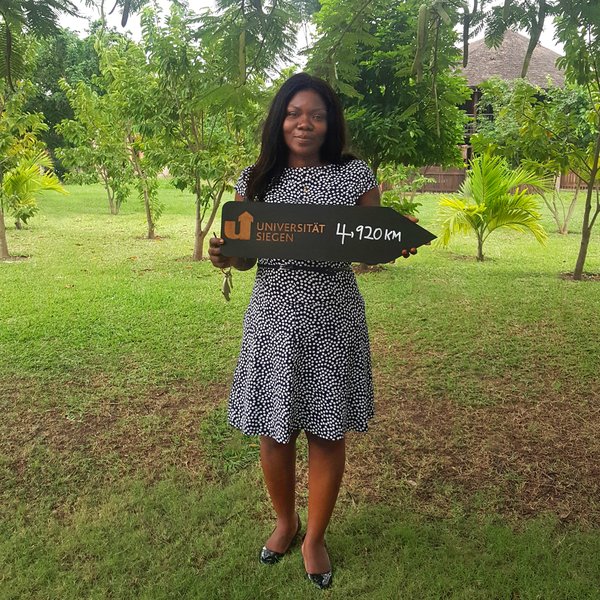
Legon Botanical Gardens of the University
of Ghana, Accra, Ghana
Accra ⇔ Siegen
[read more]
Dr. Efua E. Agyire-Tettey
is a lecturer at the Department of Social
Work, School of Social Science, University
of Ghana in Accra. She graduated in 2015
from the faculty of Education and
Psychology with a Doctoral degree of
Philosophy in Social Work from the
University of Siegen.
Dr. Efua. E. Mantey
Agyire-Tettey: "Legon Botanical
Gardens, is owned by University of Ghana
and managed by both the Department of
Botany, University of Ghana, Legon and
Mulch Company Limited. The Botanical
Gardens are located in Legon, Accra,
Ghana's capital city. The Botanical Gardens
are a beautiful outdoor play space for
persons of all ages. The garden serves as a
playground, habitat for some flora and
fauna species with a lovely dam which gives
the garden a cool ambiance. It has a
beautiful, serene atmosphere, which is a
nice and great place for a day out with
family and friends."
|
Northern Macedonia: Dr. Agron
Kurtishi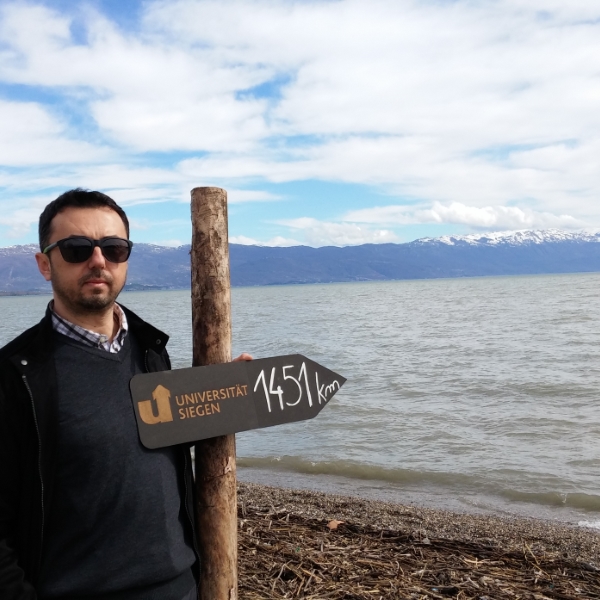
Lake Ohrid, near Struga, Northern Macedonia
Struga ⇔ Siegen
[read more]
Dr. Agron Kurtishi studied
media studies at the University of Siegen.
Currently he is the director of the Media
and Intercultural Communication study
programme at the Mother Teresa University
in Skopje, North Macedonia.
Dr. Agron Kurtishi "This
photo was shot at the Ohrid Lake in my
beloved hometown of Struga. Struga lies on
the Black Drin river and is a touristic
city in the southwest of Macedonia. The
city was founded in 300 BC and is located
at an altitude of 695 metres on the
northern shore of the Orhid Lake at the the
Black Drin’s outflow, which has its source
in the lake and flows through the city."
|
USA: Eric Marshall
Marshall Brewing Company, Tulsa, Oklahoma,
USA
Tulsa ⇔ Siegen
[read more...]
Eric Marshall studied
International Economics and German at the
at the University of Tulsa in the US state
of Oklahoma. 2003 he came to the University
of Siegen for six months as part of an
exchange programme. A time that had a great
impact on him. On the one hand, because he
found people in his host family with whom
he is still in close contact today, and on
the other hand, because he got to know
something in Siegerland that turned his
entire professional career upside down:
Beer
Eric Marshall: "Back in
Tulsa, I missed the fresh, locally brewed
beer. In Oklahoma, the alcohol laws were
very strict for a long time and many very
religious people completely rejected the
consumption of beer or wine. But times have
changed and restrictions have been relaxed.
So I started brewing my own beer at home. I
came to the conclusion that Tulsa lacked a
brewery. Through a friend I met a
brewmaster from Munich who wanted to help
me. After graduating from university, I
continued my studies at brewing institutes
in Chicago and Munich. I went to six
smaller breweries in Germany for training.
Then I worked at a brewery in Pennsylvania
for a year and then actually started my
brewery in Tulsa. That was ten years ago
now." (Eric Marshall in an interview for
the university newspaper "Querschnitt")
|
Philippines: Arnaldo Baltzar S.
Diez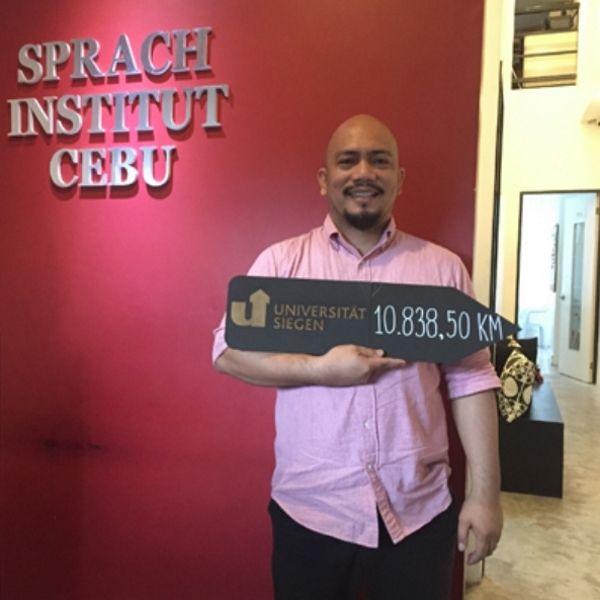
Cebu Language School, Cebu City,
Philippines
Cebu City ⇔ Siegen
[read more]
Arnaldo Diez studied
Business Administration at the University
of Siegen. Back in his home country, the
Philippines, he founded the Cebu Language
School, where he is the head and project
director of the CSR (Corporate Social
Responsibility) programme.
Arnaldo Diez: "The
language school Cebu is my work place in
the morning where I manage school issues
and realise various CSR projects. By
realising lots of CSR projects through
which we are able to help a lot of people.
In the afternoon I work at Teradyne as
“German Support“ for our German-speaking
customers in Europe."
|
Mali: Ousmane Ouattara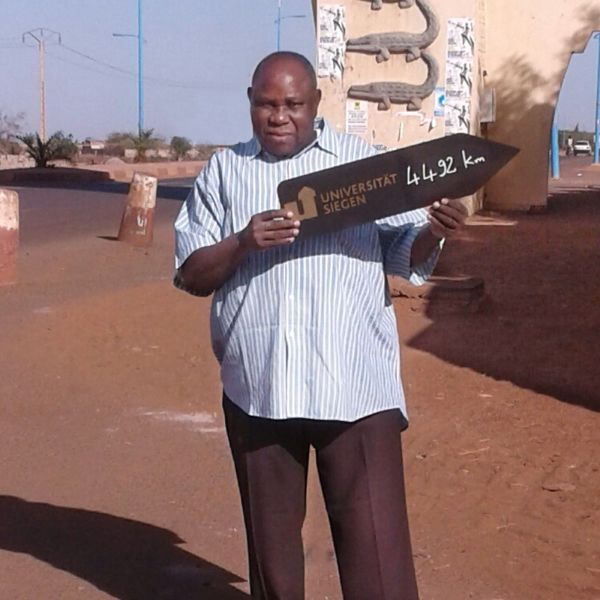
Porte d'entrée à Bamako, Mali
Bamako ⇔ Siegen
[read more...]
Ousmane Ouattara studied
his diploma in electrical engineering from
1988 - 1996 at the University of Siegen.
During his studies he specialised in
electrical energy technology. He currently
works as managing director for the
engineering company Renergiepartner-Mali
GmbH, located in Kalaban Coura, within the
district of Bamako, south of Niger in Mali.
He was already focused on energy generation
through water, sun and wind throughout his
studies. These kinds of regenerative energy
sources have many advantages for his home
country of Mali, in contrast to thermal
energy generation, which could disrupt the
delicate ecological balance of the Sahel
region. During his diploma thesis Ouattara
worked on concrete projects, such as energy
generation through hydropower in a southern
Malinese region. His objective was always
to use the knowledge that he gained in
Europe for the benefit of his home country.
Ousmane Ouattara: „Behind
me is the way to the Bamako airport MODIBO
KEÏTA - SENOU. On the display one can read
"BAMAKO MEILLEURS VOEUX 2020".
My engineering company d.h
Renergiepartner-Mali works in collaboration
with the ACCESS Energie SA company and the
ONG Mali-Folkecenter (MFC). Renergiepartner
has, together with ACCESS and MFC, supplied
electricity to more than 15 villages within
the framework of the Agency for the
Development of Domestic Energy and Rural
Electrification programme in Mali (AMADER).
Renergiepartner- Mali, i.e. my engineering
office is primarily responsible for the
electricity grid in these villages.
Renergiepartner is currently searching for
financing for an 8.5MW wind farm project in
Mali.“
|
China: Xiaolong Li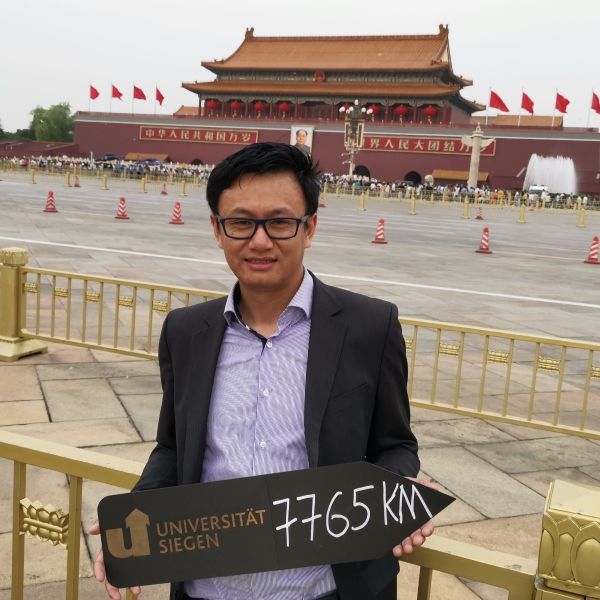
Verbotene Stadt, Peking, China
Peking ⇔ Siegen
[read more...]
Xiaolong Li completed his
studies in Business Administration with a
focus on Marketing, Entrepreneurship und
SMEs from 2006 - 2010 at the University of
Siegen. Since his graduation in 2010 he has
become a founder and manager of Sino German
Education GmbH in Beijing.
Xiaolong Li: "In the
background you can see the Forbidden City.
Within these walls is the former imperial
palace, which throughout 1420 – 1911 was
the residence of 24 chinese emperors of
various dynasties and their families. In
1987 the Forbidden City was declared a
UNESCO-World Heritage Site. It was
originally not possible for ordinary people
to enter the site. It was only in 1924,
after the last emperor had left the city,
that it was opened to the general public.
Approximately 9 million visitors arrive to
see this attraction each year"
...and about his time as a student
in Siegen: "I enjoyed my time in
Siegen very much, it was a great place to
study, and I was also able to complete my
studies early. At the University of Siegen,
theoretical and practical knowledge are
well connected, what I learnt during a
lecture in the morning could be put into
practice in the afternoon. After my
graduation in 2010 I, together with three
other University of Siegen business
administration graduates, founded our
company which specialises in educational
exchanges between China and Germany. I was
delighted that in 2018 two more graduates
from the University of Siegen joined our
company. We are now a „Siegener Haus“ in
Beijing."
|
Pakistan: Prof. Dr.-Ing. Ahmad Kamal
Nasir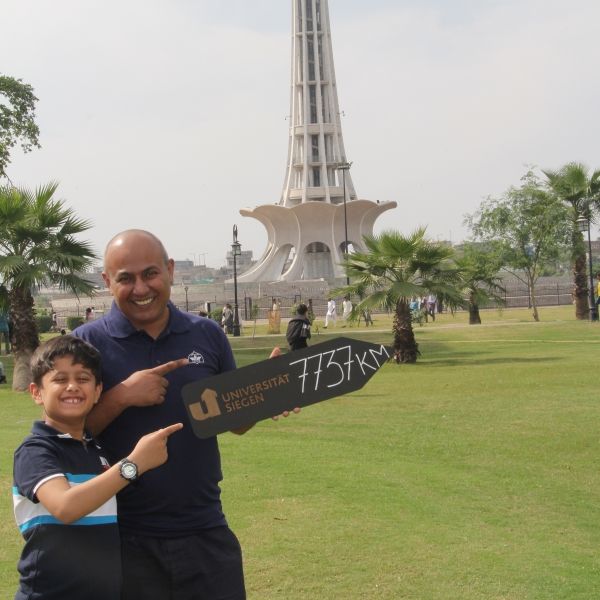
Minar-e-Pakistan (Tower of Pakistan),
Lahore, Pakistan
Lahore ⇔ Siegen
[read more]
Dr.-Ing. Ahmad Kamal Nasir
studied the mechatronics master programme
at the University of Siegen and finished
with he Ph.D.under the supervision of Prof.
Dr.-Ing. Hubert Roth. Today he is Assistant
Professor of electrical engineering and the
Director of the Engineering Laboratory at
the Lahore University of Management
Sciences (LUMS) in Pakistan.
Dr.-Ing. Ahmad Kamal
Nasir: "The picture was taken
along with my son in the heart of Lahore
near Minar-e-Pakistan (Tower of Pakistan).
Perhaps, one day he can also go to
Uni-Siegen - 7737 km - for higher
education!
Lahore is recognized by this symbolic
tower. The tower reflects a mix of Mughal
and Islamic architecture and is surrounded
by old Mughal era (Middle Ages) buildings
such as Lahore Fort, Badshahi Mosque and
various others. It is an old city compared
to other cities of Pakistan, the oldest
written authentic document about Lahore was
written in 982. Lahore is the second
largest city of Pakistan. It is also known
as the education capital of Pakistan with
more number of colleges and universities
than any other city of Pakistan."
|
Colombia: Catherine Chandellier und Jorge
Enrique Rodriguez Arenas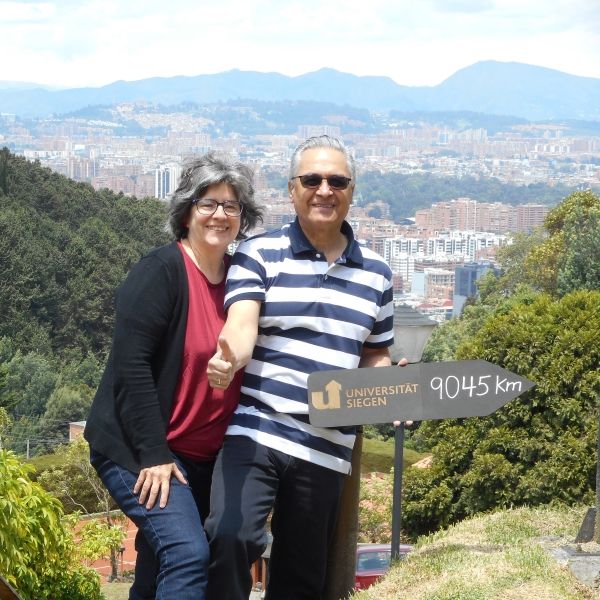
Natural preserve near the "Club La
Aguadora", Bogotá, Colombia
Bogotá ⇔ Siegen
[read more]
Catherine Chandellier
works as self-employed French teacher in
Bogotá, Colombia.
Jorge Enrique Rodriguez
Arenas is a Commercial Manager at
the Empresa de Acueducto y Alcantarillado
de Bogotá (Water Supply of Bogotá). He is
responsible for the operations of a water
supply zone in Bogotá, Colombia.
The Frenchwoman Catherine
Chandellier and the Columbian
Jorge Enrique Rodriguez
Arenas studied at the beginning of
the 80s together at the University of
Siegen. Jorge finished his civil
engineering degree in 1983 with a
specialisation on water supply. Catherine
studied teacher training from 1981 to 1986
in the subjects of French and music. Since
1986 Catherine and Jorge have been living
together with their family in Bogota,
Colombia, the home country of Jorge.
Catherine Chandellier und Jorge
Enrique Rodriguez Arenas: "When we
came back to Colombia in 1986, Bogota was a
new city for us. At this time Bogota was
already a metropole with more than 5
million citizens, it was loud and chaotic.
This photo was shot at a natural preserve
on the eastern outskirts of Bogota, located
in proximity to the “Club La Aguadora”, in
the foothills of the eastern mountain of
Colombia. From there one has a nice view of
the northern part of Bogotá.
Since our return to Bogotá, this place has
been a place of peace and adventures for
our family, similar to our unforgettable
experiences on the Hardter-Berg or in
proximity to the student residence in the
Engsbachstraße in Siegen. Siegen is our
second home and has a special place in our
hearts because it was there that we married
and became parents for the first time.
This natural preserve became our favourite
place for walks and adventures when our
children were little. As soon as we entered
the forest, we went up the hill and tried
to find our home from the top. At that time
there were no paths,, so we felt like we
were the first ones to explore this place.
Today this place is one of the most famous
places in Bogota. We decided to shoot this
photo with the University of Siegen
signpost here in remembrance of the
beautiful relaxing times we had here as a
family."
|
El Salvador: Evelio Ruano
Padilla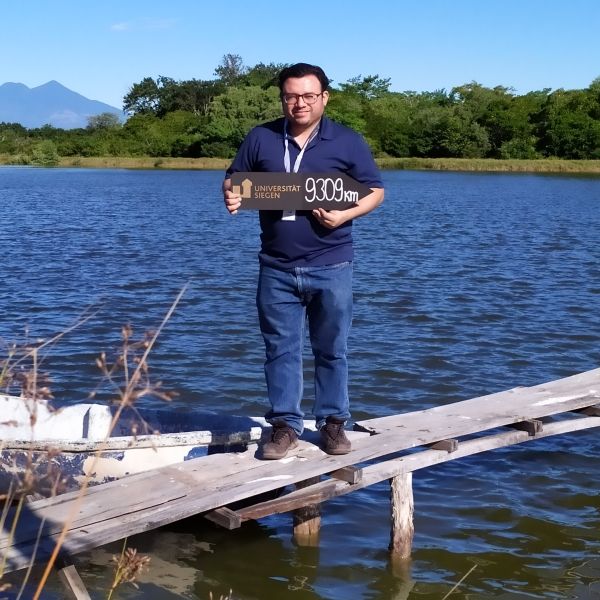
Jiquilisco-Bucht, El Salvador
San Salvador ⇔ Siegen
[read more...]
Evelio Ruano Padilla first
completed his master's degree in economic
policy in Costa Rica. He then conducted a
research internship in economic policy at
the University of Siegen in 2010 with Prof.
Dr. Peter Letmathe (chair for business
administration, with a speciality in earned
value management, particularly in SMEs). He
also participated in three summer schools
at the University from 2013-2015, which
dealt with the topic of sustainability.
Today Evelio Ruano Padilla is based in the
El Salvadorian capital city of San
Salvador, where he works for the Ministry
of Economy as an investment advisor. He
works there on numerous projects related to
economic development, one of which is shown
in the photo above.
Evelio Ruano Padilla:
"This picture was taken at a water basin in
the Jiquilisco-bay, which consists of
wetlands containing mostly Mangroves, which
are managed by a cooperative dedicated to
the rearing of shrimps. This cooperative
receives financial support from the
ministry of economy to modernise their
technology, this enables higher
productivity without increasing the impact
upon the environment. The Jiquilisco-Bay
was admitted to the Ramsar Convention in
2005, this convention is dedicated to the
protection of internationally important
wetlands. The bay is home to many different
animal species, and is an ideal place to
observe a variety of different seabirds,
such as the American Skimmer, Wilson's
Plover, Brown-mantled Oystercatcher and
many others. In the background of this
photo you can see the „Chichontepec“
volcano, which is approximately 2173m high,
the second highest volcano in El Salvador."
… and about his time as a student
in Siegen: "The experiences which
I had in Siegen weren‘t only valuable from
an academic and cultural perspective, but
also from an interpersonal one. While I was
there I developed some very important
friendships, including Juliam Muhlack, who
then worked for the Alumni team, which
organised and carried out the Alumni Summer
Schools. I helped him to get an invitation
to do an internship at the Ministry of
Economy in El Salvador, this further
deepened our friendship, and it continues
on to this day."
|
Kenya: Francis Mwangi Mugo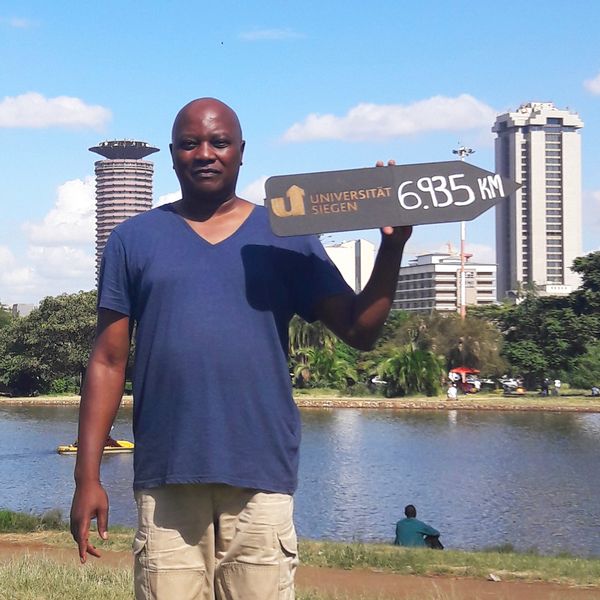
Uhuru Park, Nairobi, Kenya
Nairobi ⇔ Siegen
[read more]
Francis Mwangi Mugo
studied Business Administration and
Economics at the University of Siegen. In
2003, he graduated with a Masters degree in
Business Administration followed by a
Bachelor of Arts degree in Economics in
2005. Having specialized in Business
Computing, he expanded his interest in this
area and returned to Kenya in 2006.
Currently, he works as an IT-Consultant at
the Eastern Africa Standby Force (EASF) in
Nairobi, which is only 15 km away from the
city centre. Francis Mwangi Mugo also works
with a team of seasoned professionals who
are responsible for the IT-matters during
various multinational/multi-dimensional
missions and peacekeeping exercises rolled
out by EASF or the African Union (AU).
Francis Mwangi Mugo: "This
photo was shot in the famous “Uhuru Park”;
a term meaning "Freedom Park" in Swahili
language. The park, which lies in the heart
of Nairobi city, is very popular with
tourists and locals. In 2017, it started
hosting a number of skateboarding
competitions next to the traditional
boating. The park owes its existence to a
fierce battle fought by the late Nobel
Prize Laureate and ardent environmentalist,
Professor Wangari Maathai against the then
political establishment in 1989. The then
regime had sought to convert the public
recreation park into private property. With
the support of the majority of the citizens
of Kenya, she won the battle. A lot of
people visit the park to relax and have
fun, especially over weekends
|
China: Prof. Dr. Tao Jiang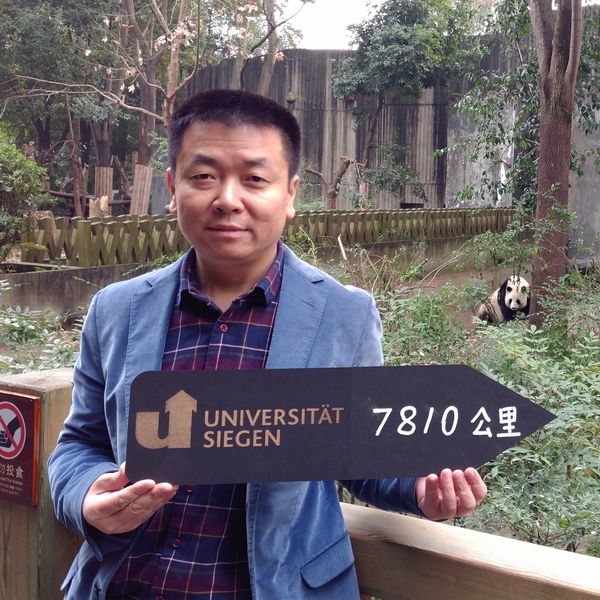
Chengdu Research Base of Giant Panda
Breeding, China
Chengdu ⇔ Siegen
[read more]
Dr. Tao Jiang completed
his doctorate in electrical engineering at
the University of Siegen in 2013 with Prof
Kuhnert, Institute for Real-Time Learning
Systems. Currently Dr. Tao Jiang is a
professor and Vice Dean at the College of
Automatic Control Engineering of Chengdu
University of Information Technology in
Chengdu,Sichuan province, China.
Dr. Tao Jiang: "This photo
was shot at the „Chengdu Research Base of
Giant Panda Breeding“, the research station
for the breeding of the big Panda in
Chengdu, Sichuan province. The research
station is about 10 km outside Chengdu city
centre and is known as a major Panda
breeding station, as the centre for the
conservation of threatened local wildlife
through research, conservation, education
and education."
|
Canada: Dr. Simon K. Nderitu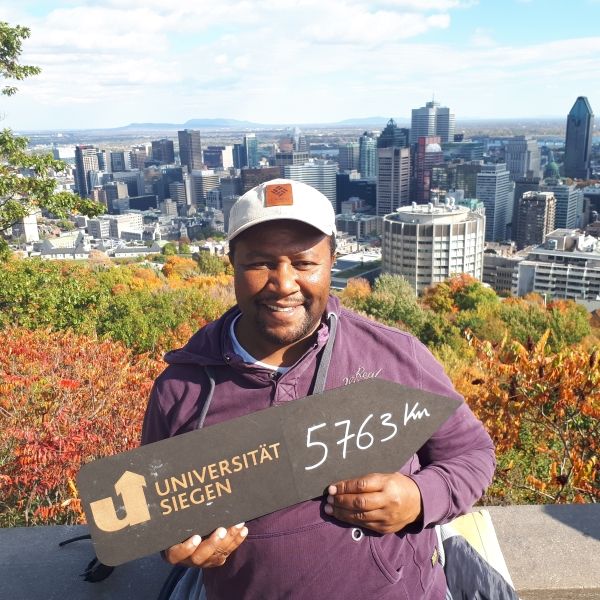
Mount Royal, near the city of Montreal,
Quebec, Canada
Montreal ⇔ Siegen
[read more]
Dr. Simon K. Nderitu is a
Scientific Computing Analyst at the McGill
HPC Centre, the McGill University's centre
for High Performance Computing (HPC) in
Montreal, Quebec, Canada. He graduated in
2003 as a Master of Science in
Physics/Experimental Particle Physics from
the University of Siegen.
Dr. Simon K. Nderitu: "The
Mount Royal is located immediately west of
Downtown Montreal. It gave the city
Montreal its name. This hill is part of the
Monteregian Hills which consists of three
peaks: Colline de la Croix/Mount Royal
(233m), Colline d'Outremont/Mount Murray
(211m), and Westmount Summit (201m) above
mean sea level."
|
Indien: Dilip Kumbham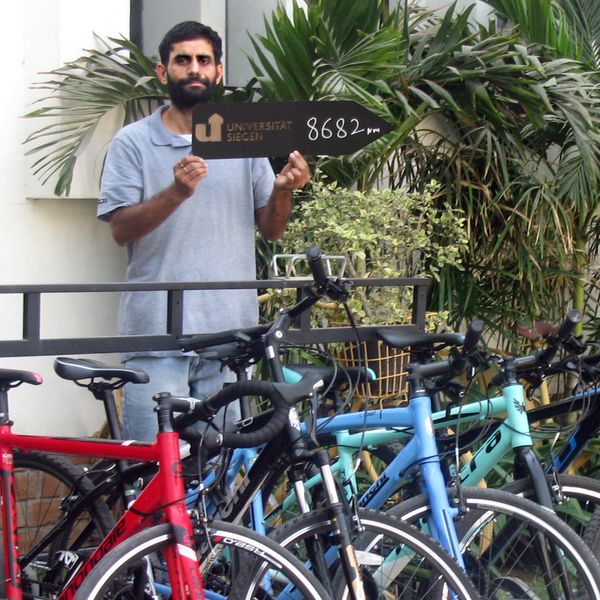
Ciclo Cafe Hyderabad, Hyderabad, Indien
Hyderabad ⇔ Siegen
[read more]
Dilip Kumbhamn hat an der
Universität Siegen den Masterstudiengang
Mechatronics studiert. Nach seinem
Studienabschluss hat er zunächst in seinem
Heimatland Indien in Hyderabad als Dozent
für das Unternehmen NIIT gearbeitet.
Inzwischen arbeitet er in einer
Organisation, die sich für alternative
Mobilität in der Stadt engagiert.
Dilip Kumbhamn: "Das Ciclo
Café, ein spezielles Projekt von TI CYCLES,
dient dem Aufbau einer
Radfahrer-Gemeinschaft in meiner Stadt.
Einen durchschnittlichen Angestellten
kostet der Hin- und Rückweg zur Arbeit in
Hyderabad sowohl via Motorrad, Auto oder
Öffentlichen Verkehrsmitteln täglich etwa
zwei Stunden. Wir haben festgestellt, dass
diese zwei Stunden reduziert und effektiv
genutzt werden können, wenn man nur sein
Fahrrad benutzt! Gleichzeitig werden
Verkehrsstaus reduziert. Das Hauptproblem
unseres Vorhabens ist, dass die allgemeine
Meinung herrscht, Fahrradfahren sei
unsicher und langsam. Deshalb bieten wir
gemeinsame Radtouren an, um den Leuten zu
beweisen, dass das Rad eine schnelle und
sichere Alternative ist: Cycling is one of
the major solutions to our congested
cities, air pollution and growing health
issues!"
|
Iran: Prof. Dr. Seyed Mohammadamin
Emami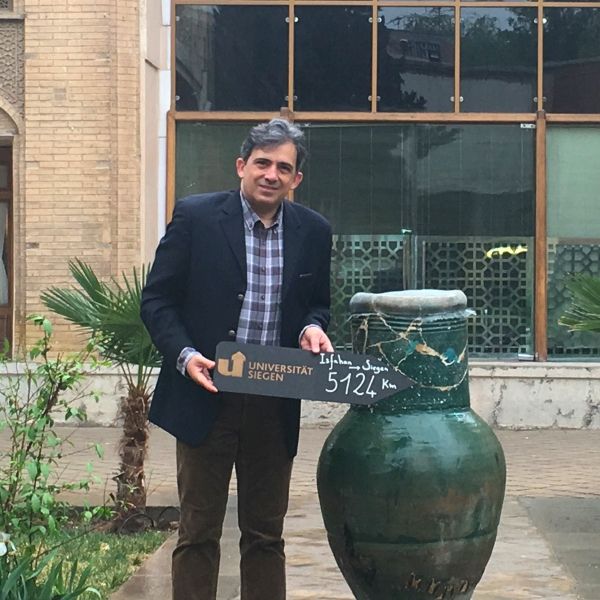
Art University Isfahan, Isfahan, Iran
Isfahan ⇔ Siegen
[read more]
Dr. Seyed Mohammadamin
Emami graduated in 2008 with a
doctorate in chemistry from the Institute
for Buildings and Materials Chemistry at
the University of Siegen. His doctoral
studies specialised in minerology and were
supervised by Prof. Trettin. Today Dr Emami
is assoc. Professor for mineralogy and
crystallography and is also the Vice Dean
and director of the International Office at
Isfahan University of Art in Iran. His
research interests lie in the field of
archaeometry,which is one of the most
important research areas in the Middle
East.
Dr. Seyed Mohammadamin
Emami: "This building at the
Isfahan University of Art ,which contains
my office, is 250 years old, making it one
of the oldest parts of the University."
|
